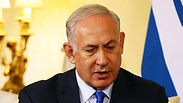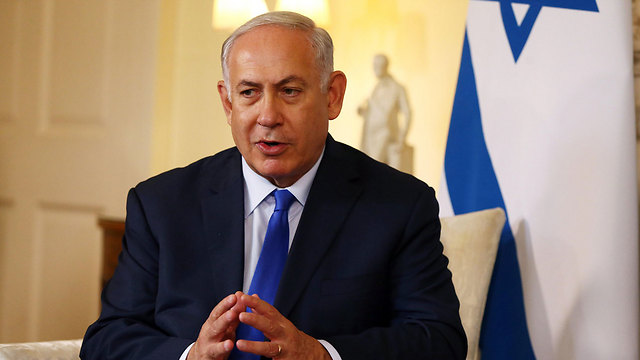
Let’s stop lying to ourselves about a Palestinian state
Op-ed: In London, Netanyahu finally told the truth about the Israeli-Palestinian conflict: There will be no full Palestinian independence, as it’s too dangerous. What we are left with is an extended autonomy, a state minus—as long as the security restrictions and political separation are maintained.
Prime ministers discuss ideology in two cases: Either before they rise to power or when they step down. It’s one of the best reasons for limiting a prime minister’s term, to give him a limited amount of time to implement his beliefs or abandon them (in the event that he lied).
Last Friday, at the Chatham House independent policy institute in London, Netanyahu was asked about the option of a Palestinian state. He replied that we have seen many Muslim states in the Middle East fail and that the model of modern sovereignty with no boundaries should be reexamined (in other words, we should no longer rely on the 1967 borders).
To the people sitting in the room it may have seemed like another typical attempt to avoid making any progress towards a Palestinian state, but there was actually a refined moment of truth there.
Since the Bar-Ilan speech, which was basically forced on Netanyahu by former US President Barack Obama, Israel has been lying to itself and lying to the world. There is no prime minister who believes in a return to the 1967 lines, including minor border corrections.
There will be no such prime minister, if only due to the familiar limitations of Jerusalem, refugees and Israeli settlers. There is no Palestinian leader who would agree to settle for a state that would be established on less than that. That’s the only fact the involved parties agree on. From here, the matter is subject to interpretation.
In the past few years, when Israeli representatives have spoke about an Israeli state, what they meant is an extended autonomy in which the Palestinians have political (and diplomatic) control, but Israel retains permanent security access. They mean supervised crossings. In short, they mean something very similar to what we have today. The only difference between Right and Left in this context is the size of the discussed territory.
When the Palestinians talk about a Palestinian state, they see Israel in their imagination, and when the international community deals with two states for two people, they see the Green Line.
These differences are the source of the dispute with the international community, and sometimes the reason why the State of Israel is misunderstood. Their immediate question is how can we bridge between statements and action: If we want two states for two people, why are we building beyond the 1967 lines?
About a year ago, when Trump was elected president, there was a unique opportunity to present a different Israeli vision from the Bar-Ilan speech and convince the Americans to accept a different sovereignty model to the one that has been discussed in countless conversations since the Oslo Agreements. Israel chose to mumble something unclear, and in response emissaries popped up, as well as Trump’s mysterious peace initiative, which no one really know what it’s about.
The Israeli strategy for the past decade has been to lie, and to maneuver until the dangerous winds have blown over. But the danger is still here and the lie hasn’t advanced us anywhere.
Two years ago, I sat with the leader of one of the opposition parties, who told me about a negative campaign that had been planned against Netanyahu. In one of the polls, they checked whether presenting him as a liar on Israeli-Palestinian issues would help drive voters away. Politics is ugly on all sides. The findings were surprising: The Right believed he was lying for the Land of Israel. The Left believed he was lying and had no intention of making progress in that area. Everyone agreed and no one was surprised.
What is true for domestic relations is problematic where foreign relations are concerned, which is why the London event is so interesting, because it made Netanyahu say what he has been saying behind closed doors for a long time now: The truth about the Israeli-Palestinian conflict.
We can’t reach an absolute solution of Israel-style Palestinian independence. It won’t happen because it’s too dangerous, no matter how many Bar-Ilan speeches are delivered on the way. What we have is basically an extended autonomy, a state minus, an entity or even a Palestinian empire, if that’s what they wish to call it—as long as it’s clear that the foundation is the existing Palestinian Authority territories, a political separation from Israel and maintaining the security restrictions. A different kind of sovereignty. We should have said this a long time ago.


















